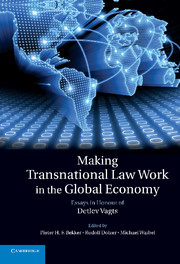Book contents
- Frontmatter
- Contents
- List of contributors
- Foreword: the transnationalism of Detlev Vagts
- List of cases cited
- List of abbreviations and acronyms
- Introduction: a Festschrift to celebrate Detlev Vagts' contributions to transnational law
- 1 Detlev Vagts and the Harvard Law School
- 2 Constructing and developing transnational law: the contribution of Detlev Vagts
- I International law in general
- II Transnational economic law
- 14 Sovereignty-plus in the era of interdependence: toward an international convention on combating human rights violations by Transnational Corporations
- 15 The noisy secrecy: Swiss banking law in international dispute
- 16 Not-for-profit organisations, conflicts of laws and the right of establishment under the EC Treaty
- 17 The meaning of ‘investment’ in the ICSID Convention
- 18 Toward a proper perspective of the private company's distinctiveness
- 19 Administrative law and international law: the encounter of an odd couple
- 20 Making transnational law work through regime-building: the case of international investment law
- 21 Creditor protection in international law
- 22 Stability, integration and political modalities: some American reflections on the European project after the financial crisis
- III Transnational lawyering and dispute resolution
- Bibliography of Detlev Vagts
- Index
17 - The meaning of ‘investment’ in the ICSID Convention
from II - Transnational economic law
Published online by Cambridge University Press: 17 November 2010
- Frontmatter
- Contents
- List of contributors
- Foreword: the transnationalism of Detlev Vagts
- List of cases cited
- List of abbreviations and acronyms
- Introduction: a Festschrift to celebrate Detlev Vagts' contributions to transnational law
- 1 Detlev Vagts and the Harvard Law School
- 2 Constructing and developing transnational law: the contribution of Detlev Vagts
- I International law in general
- II Transnational economic law
- 14 Sovereignty-plus in the era of interdependence: toward an international convention on combating human rights violations by Transnational Corporations
- 15 The noisy secrecy: Swiss banking law in international dispute
- 16 Not-for-profit organisations, conflicts of laws and the right of establishment under the EC Treaty
- 17 The meaning of ‘investment’ in the ICSID Convention
- 18 Toward a proper perspective of the private company's distinctiveness
- 19 Administrative law and international law: the encounter of an odd couple
- 20 Making transnational law work through regime-building: the case of international investment law
- 21 Creditor protection in international law
- 22 Stability, integration and political modalities: some American reflections on the European project after the financial crisis
- III Transnational lawyering and dispute resolution
- Bibliography of Detlev Vagts
- Index
Summary
The term ‘investment’ is a gateway that limits access to the dispute resolution mechanism established by the 1965 Convention on the Settlement of Investment Disputes Between States and Nationals of Other States (the ‘ICSID Convention’). If the term has a narrow and precise meaning, then a number of disputes that the parties have agreed to submit to ICSID may have no forum for resolution. If the term has a broad and flexible meaning, then the ICSID system will be poised to accept most, if not all, of the cases that the parties have consented to submit to ICSID arbitration.
A concrete example serves to illustrate the issue. A company organised under the law of an ICSID Contracting State holds a demand account with a bank in another Contracting State. A bilateral investment treaty is in force between the two countries that provides only for ICSID arbitration of disputes between investors and a State. The host country seizes the funds credited to the company's bank account without any offer of compensation.
Under the definition used in many investment treaties, the funds credited to the bank account could qualify as an ‘investment’ covered by the treaty. The credit is an asset of the company in the territory of the host country, a right conferred by the account agreement with the bank and a claim to money.
- Type
- Chapter
- Information
- Making Transnational Law Work in the Global EconomyEssays in Honour of Detlev Vagts, pp. 326 - 356Publisher: Cambridge University PressPrint publication year: 2010



